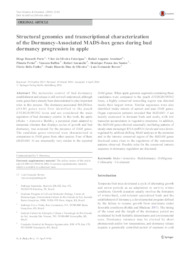Structural genomics and transcriptional characterization of the Dormancy-Associated MADS-box genes during bud dormancy progression in apple.
Structural genomics and transcriptional characterization of the Dormancy-Associated MADS-box genes during bud dormancy progression in apple.
Author(s): PORTO, D. D.; FALAVIGNA, V. da S.; ARENHART, R. A.; PERINI, P.; BUFFON, V.; ANZANELLO, R.; SANTOS, H. P. dos; FIALHO, F. B.; OLIVEIRA, P. R. D. de; REVERS, L. F.
Summary: The molecular control of bud dormancy establishment and release is still not well understood, although some genes have already been demonstrated to play important roles in this process. The dormancy-associated MADS-box (DAM) genes were first identified in the peach EVERGROWING locus and are considered the main regulators of bud dormancy control. In this work, the apple (Malus × domestica Borkh.), a perennial plant adapted to temperate climates that displays cycles of growth and bud dormancy, was screened for the presence of DAM genes. The candidate genes retrieved were characterized in comparison to DAM genes from other species. Four of them (MdDAM1?4) are structurally very similar to the reported DAM genes. When apple genomic segments containing these candidates were compared to the peach EVERGROWING locus, a highly conserved noncoding region was detected inside their largest intron. Similar sequences were also identified inside introns of apricot and pear DAM genes. Organ expression patterns revealed that MdDAM1?4 are mainly expressed in dormant buds and seeds, with low transcript accumulation in vegetative structures. In addition, the MdDAM genes showed seasonally oscillating patterns of steady-state messenger RNA (mRNA) levels and were downregulated by artificial chilling. Motif analyses in the promoter and in the intronic conserved region of the MdDAM genes disclosed some clues to the regulation of the expression patterns observed. Possible roles for the conserved intronic sequence in dormancy regulation are discussed.
Publication year: 2016
Types of publication: Journal article
Unit: Embrapa Semi-arid Region
Observation
Some of Embrapa's publications are published as ePub files. To read them, use or download one of the following free software options to your computer or mobile device. Android: Google Play Books; IOS: iBooks; Windows and Linux: Calibre.
Access other publications
Access the Agricultural Research Database (BDPA) to consult Embrapa's full library collection and records.
Visit Embrapa Bookstore to purchase books and other publications sold by Embrapa.

